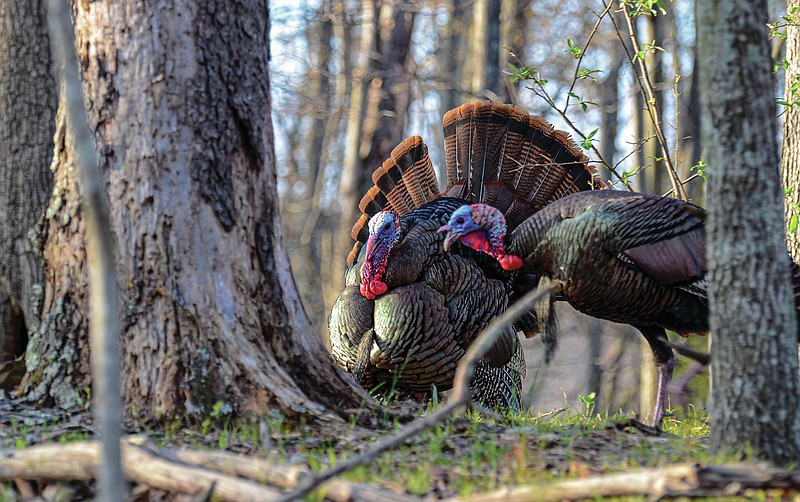The big turkey gobbler opened one eye. He sat motionless on his roost limb, surveying what could see of his domain. It wasn't much as it was still dark, with just enough glow in the east to hope for a new day.
A cardinal tweeted a sleepy good morning, and then a hen turkey called very softly about 150 yards to his left. The gobbler opened both eyes and immediately went into a puffed-up halfway strut on the limb. In truth, the strutting posture in his precarious position made him look a little ridiculous, but the turkey didn't know it.
He was just doing what turkeys do. Right now, that was trying to attract girl turkeys.
In his semistrut mode, the turkey began to emit a low moaning or drumming sound that almost defied description. It was not vocal, coming from his beak, but emanated from his lungs and the air sacs attached to them. (This is basically what some turkey biologists think, though no one is really sure.) The sound was very low and had a strange quality that seemingly made it hard to pin down as to where exactly it was coming from.
(READ MORE: Honestly, sometimes turkey hunting is just plain hard)
At the beginning of this procedure, the gobbler would have a sharp intake of air that made another short, strange sound. Many turkey hunters call this the "spit." After that, the low humming of the "drum" would begin. Hence, many hunters refer to this as the "spit and drum."
Now the gobbler was up and alert and could see the forest floor in the dim light. Like it or not, this day was coming, and all that it brought with it.
The turkey peered over every inch of the ground below him. It was tempting to fly down because of the hen calls he had heard, but he needed to have a little more light to feel safe leaving his perch. A coyote or a bobcat could be lying in wait in the semidarkness, and he was too wary in his years to make this mistake. The turkey didn't really know what a coyote or bobcat is, mind you, but he had been rushed by predators in the past and always made his escape.
As the light increased, he began to hear more turkey sounds from down the hill below him. Two more hens began their morning gossip about whatever it is that girl turkeys talk about. When one of the hens began calling aggressively and did a cackle that seemed to say "fly down," he couldn't help himself.
The big turkey exploded with a thunderous gobble.
(READ MORE: New hunter offers fresh perspective this spring)
Most of the forest sounds up till now had been fairly subdued, but the gobble broke the calm of this new day, and it was on. Now the gang of hens below him began calling randomly, and all of the chatter did not sound that nice. Next a couple of young male turkeys in their first year — these boys are known as jakes — tried a couple times to do an ill-sounding gobble. This really got the old guy's attention, and he answered with a deafening double gobble.
He did not want these young punks talking to the hens, at all, and would just have to get down there and settle their hash. Quickly.
With no warning, the gobbler launched off the limb and sailed down the hill, but not directly toward the hen convention he had been listening to. He had not forgotten the soft tree calls he had heard earlier and had to check this out.
The gobbler made a pass to where the calls had come from and stood motionless for several minutes, looking for the hen he heard earlier. He may have stayed longer, but the gang of hens behind him with the jakes were going to town calling. He hotfooted it around the hill.
When the jakes saw the big gobbler approach, they didn't even stay around to discuss the matter. They had been subjected to the spurs of this gobbler before and really didn't want to do that again. They would stay away so as not to raise the ire of this old turkey; maybe next year.
The gobbler and hens quickly settled into the morning routine. The hens would wander around feeding; the gobbler would mostly follow them while strutting, gobbling occasionally and trying to look important. The hens would slowly make their way to an open field, and the gobbler would spend several hours there strutting, gobbling and showing everyone he would take on any challengers.
Several hundred yards back at the roost tree, I could finally relax.
The soft hen calls had been me, and I had broken one of my own rules in scouting for turkeys before the season: Don't call to turkeys you are going to hunt! Call to turkeys during the preseason if you are not going to hunt them, or call to somebody else's turkeys, but don't educate the turkeys you will hunt and give them a Ph.D. in avoiding hunters!
Oh well. I lucked out this time. The gobbler didn't see me because I sat motionless and didn't breathe as he seemed to stare a hole through me looking for a hen.
I wish all you a safe and wonderful spring turkey season. Take a kid along and introduce them to the crazy world of turkey hunting.
"Guns & Cornbread" is written by Larry Case, who lives in Fayette County, W.Va. You can write to him at larryocase3@gmail.com.
